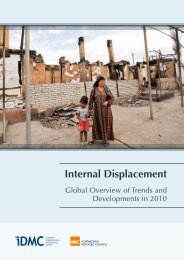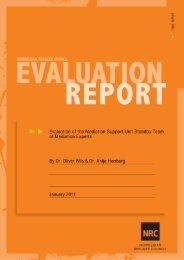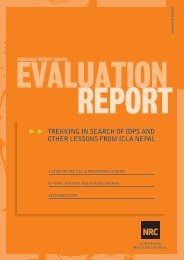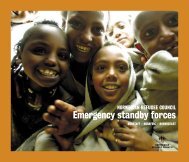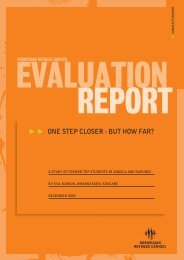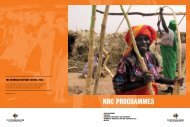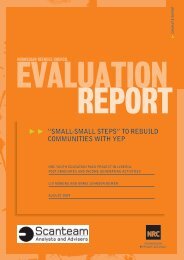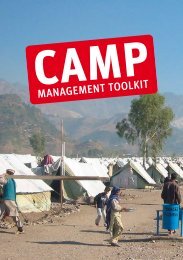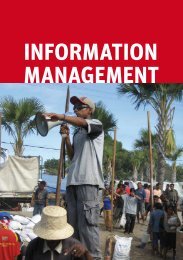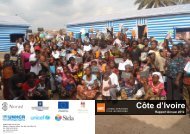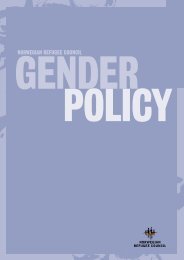evaluation of general food distribution in northern uganda: gulu ...
evaluation of general food distribution in northern uganda: gulu ...
evaluation of general food distribution in northern uganda: gulu ...
Create successful ePaper yourself
Turn your PDF publications into a flip-book with our unique Google optimized e-Paper software.
• Where NRC, WFP, district authorities and other stakeholders coherent <strong>in</strong> their understand<strong>in</strong>g andimplementation <strong>of</strong> the FFL project?Coverage• Were the <strong>in</strong>tervention criteria chosen appropriately at different stages <strong>of</strong> the project?Impact• Has the FFL project identified quantitative and qualitative <strong>in</strong>dicators to measure the impacts <strong>of</strong> itsactivities? Are monitor<strong>in</strong>g and analysis mechanisms <strong>in</strong> place?• What <strong>in</strong>tended and un<strong>in</strong>tended, positive and negative effects are produced by the FFL proj ect, both onthe population <strong>of</strong> concern and others who are affected?• Does the FFL project produce the most appropriate impact, given the situation and recourses available?• What can be done to avoid any negative impact or to enhance any positive impact?Connectedness• Have l<strong>in</strong>kages between relief and recovery phases been established?• To what extent has national and local capacity been supported?• To what extent are the GoU and the districts able to ensure that the IDPs m<strong>in</strong>imum nutritional needs arecovered after end <strong>of</strong> the FFL project?Cross cutt<strong>in</strong>g issues:• Gender – how has the FFL project adopted a gender sensitive approach?• Protection – how has the FFL project ensured that protection concerns have been <strong>in</strong>corporated andrights based approach adopted?Specific issues for consideration:Possible consequences if the FFL operation is scaled down too rapidlyDue to a relatively stable security period over the last year, the GoU, various <strong>in</strong>ternational and nationalorganizations and donors are prepar<strong>in</strong>g a transitio n from emergency phase to recovery and development phase.This has its basis <strong>in</strong> the Peace, Recovery and Development Plan (PRDP), launched by the GoU <strong>in</strong> October 2007.In this situation the pressure for IDPs to move to transit sites and their homes <strong>of</strong> orig <strong>in</strong> is <strong>in</strong>creas<strong>in</strong>g.Simultaneously there is a pressure for <strong>in</strong>ternational organizations to reduce humanitarian assistance anddevelopment organizations to gradually take over.In accordance to this, there will be a reduction <strong>of</strong> IDPs receiv<strong>in</strong>g <strong>food</strong> rations i n 2009. The question is the rate <strong>of</strong>which the reduction <strong>of</strong> <strong>food</strong> assistance or a scale down will take place. Monitor<strong>in</strong>g <strong>of</strong> the <strong>food</strong> security situation forthe IDPs is a key factor, and climatic changes result<strong>in</strong>g <strong>in</strong> natural disasters i.e. <strong>in</strong> 2007 prolonged h eavy ra<strong>in</strong> andfloods dur<strong>in</strong>g the ra<strong>in</strong>y season affected the harvest <strong>in</strong> August and September. WFP and NRC have <strong>in</strong>cludedcont<strong>in</strong>gency plann<strong>in</strong>g for the worst case scenario <strong>in</strong> their strategy for the upcom<strong>in</strong>g PRRO period (2008 -2010).Consequences <strong>of</strong> a rapid scale down need to be taken <strong>in</strong>to account <strong>in</strong> an assessment <strong>of</strong> the rema<strong>in</strong><strong>in</strong>g projectperiod.Conclusions and results from the <strong>evaluation</strong> should culm<strong>in</strong>ate <strong>in</strong> recommendations for the NRC FFLproject and gradual phase -out over the next 2 -3 year period (2008 – 2009/2010).E. Evaluation teamThe <strong>evaluation</strong> team will be composed <strong>of</strong> two persons. The team leader will lead the work <strong>of</strong> the team and beresponsible for complet<strong>in</strong>g the report. The team leader should have skills and proven background <strong>in</strong> <strong>evaluation</strong>s<strong>of</strong> humanitarian assistance projects <strong>in</strong> emergency/relief/recovery phases, preferably with <strong>food</strong> assistance andexperience with situation <strong>of</strong> forced displacement. The regional/national team member should have knowledge andexpertise <strong>in</strong> humanitarian assistance and goo d knowledge <strong>of</strong> the culture and conflict <strong>in</strong> the region. The teammembers should be gender aware.An Evaluation Steer<strong>in</strong>g Committee will be established, with the follow<strong>in</strong>g members: Advisor for Evaluation, NRCHQ; Advisor for Distribution, NRC HQ; Programme Director, NRC CO, Uganda;, Project Manager, GFD/FFL,NRC CO, Uganda; and Program Coord<strong>in</strong>ator for Uganda, NRC HQ. The <strong>evaluation</strong> manager is Advisor forEvaluation, NRC HQ,The ma<strong>in</strong> function <strong>of</strong> the Steer<strong>in</strong>g Committee will be to select the external evaluato rs, review prelim<strong>in</strong>ary f<strong>in</strong>d<strong>in</strong>gsand recommendations and establish a dissem<strong>in</strong>ation and utilisation strategy. The ma<strong>in</strong> function <strong>of</strong> the EvaluationManager will be prepar<strong>in</strong>g the terms <strong>of</strong> reference (<strong>in</strong> close collaboration with the stakeholder and members <strong>of</strong> thesteer<strong>in</strong>g committee), adm<strong>in</strong>istration and over all co -ord<strong>in</strong>ation, <strong>in</strong>clud<strong>in</strong>g monitor<strong>in</strong>g progress.58




